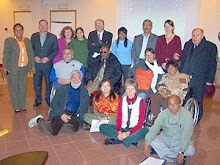Marlene Wiens translated the comments from Rocio and Ofelia of ASODISPIE in Piedecuesta, Colombia:
1. Some of us, who have long experience of living with our conditions and repeated experiences with health services, we may already have lot of knowledge and skills needed for our own medical care. We need to acknowledge and value these knowledge and skills.
Comments: Some people have good knowledge about some things but not all knowledge is correct. In other persons there has been so much over-protection that has resulted in a lot of conformity and it is difficult for them to change. Also, the cultural influence affects the attitude of family members and people with disability. At this moment they are in a point of reflection and they are looking at change. Some have recognized that their children can do many things and people with disability have recognized many abilities in themselves.
2. Understanding and learning about the body processes and principles of self care is part of controlling our own lives and taking control of decisions that influence quality of our lives. We may be used to delegating this responsibility to health care professionals and others. Some of us may not feel comfortable with taking greater responsibility about our own care. This is equally legitimate. At the same time, for those of us who wish, we need the possibility of learning more about ourselves, our bodies and about different skills needed for our care.
Comments: The 2 types exist in Asodispie. Some want to do something and they help themselves to achieve better health. But others think that the doctor is the only person responsible, or they give the responsibility to family members. But the best is to learn more about our bodies and this will improve our quality of life. The majority in our groups now understand that self care is their own responsibility. The reluctant ones were motivated by other persons more advanced. As a result of sharing experiences they noticed that they couldn’t stay in ignorance. Also practicing skills during the meetings helped to stimulate people.As the process continues, we need to persevere so they can learn to overcome their difficulties. The personal decision is very important in reaching this point, but the influence of the group is key.
3. We are human beings and not just bodies with disabilities. Often health professionals ignore our global dimension and focus only on our medical care needs. Our own interaction and sharing of experiences can give us the opportunity to look at our global dimension, identify areas not being addressed by health professionals and sought answers to our unmet needs.
Comments: It has been our experience that professionals see the person with disability as an object of health and not as a person. This results in resistance to go to medical clinics. But as the process continues, the professionals are starting to see people in a more holistic manner. This is especially true of those who work with Asodispie. We believe that little by little the professionals in the clinics will see disabled people in a different way as well.Self help groups are important to provide the emotional and psychological support that the health professionals do not. We need to keep working with the other parts of life that are not related with health so people see themselves as holistic people.
Subscribe to:
Post Comments (Atom)


No comments:
Post a Comment